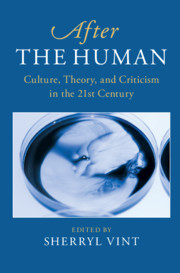Book contents
- After the Human
- After Series
- After the Human
- Copyright page
- Contents
- Contributors
- Acknowledgments
- Introduction
- Part I After Humanism
- Part II New Objects of Enquiry
- Chapter 6 Machines, AIs, Cyborgs, Systems
- Chapter 7 Animals
- Chapter 8 Life “Itself”
- Chapter 9 The Anthropocene
- Chapter 10 The Inorganic
- Part III Posthumanities
- Collective Works Cited
- Index
Chapter 7 - Animals
from Part II - New Objects of Enquiry
Published online by Cambridge University Press: 26 November 2020
- After the Human
- After Series
- After the Human
- Copyright page
- Contents
- Contributors
- Acknowledgments
- Introduction
- Part I After Humanism
- Part II New Objects of Enquiry
- Chapter 6 Machines, AIs, Cyborgs, Systems
- Chapter 7 Animals
- Chapter 8 Life “Itself”
- Chapter 9 The Anthropocene
- Chapter 10 The Inorganic
- Part III Posthumanities
- Collective Works Cited
- Index
Summary
The fraught histories of both animal studies and posthumanism as intellectual formations help to explain why ongoing, creative syntheses are proving especially necessary for the wellbeing of humanities scholarship. Maintaining a laser focus on the machine-human hybrid arguably has aided the development of postanthropocentric at the expense of anti-speciesist impulses in posthumanism. At the same time, while a distinct field of study has coalesced around concerns pertaining to nonhuman animate life, debates about what to call it—animal studies, human-animal studies, critical animal studies, etc.— often turn on what role posthumanist theory plays in its genealogy. With an eye toward new developments in and across these discussions, this chapter explores how various posthumanist perspectives on humans, animals, and human-animal relationships themselves foster productive ambivalences, though not without controversy, and points to some promising cross-fertilizations taking shape in fiction (especially sf), plant studies, and what some are calling postanimalism.
Keywords
- Type
- Chapter
- Information
- After the HumanCulture, Theory and Criticism in the 21st Century, pp. 105 - 119Publisher: Cambridge University PressPrint publication year: 2020
- 1
- Cited by

